What's New
Displaying results 4811 - 4820 of 4911
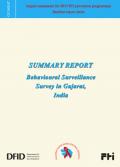
Resource | Publications,
This report is part of a series of baseline surveys conducted to monitor the impact of HIV/STI prevention programmes in five states of India: Andhra Pradesh, Gujarat, Kerala, Orissa, West Bengal and in the Healthy Highways Project.
This report is a summary of the methodology and findings of the Gujarat HIV Risk Behavioural Surveillance Survey (BSS). This survey, which was a part of the impact assessment of HIV prevention activities in Gujarat, was conducted in late 1999, for the Gujarat State AIDS Control Society (GSACS).
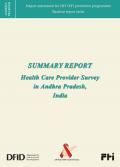
Resource | Publications,
This report is part of a series of baseline surveys conducted to monitor the impact of HIV/STI prevention programmes in five states of India: Andhra Pradesh, Gujarat, Kerala, Orissa, West Bengal and in the Healthy Highways Project.
The Health Care Provider Survey (HCPS), Andhra Pradesh was conducted during November 1999 – September 2000. The purpose of this study was to collect baseline information on the quality of STI case management provided by health care providers (HCPs) in Andhra Pradesh.
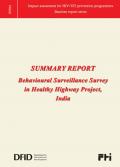
Resource | Publications,
This report is part of a series of baseline surveys conducted to monitor the impact of HIV/STI prevention programmes in five states of India: Andhra Pradesh, Gujarat, Kerala, Orissa, West Bengal and in the Healthy Highways Project.
This report is a summary of the methodology and findings of the Healthy Highways Project (HHP) HIV Risk Behaviour Surveillance Survey (BSS). This survey was part of the impact assessment of HIV prevention activities in the HHP and was conducted in the year 2000.
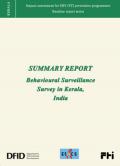
Resource | Publications,
This report is part of a series of baseline surveys conducted to monitor the impact of HIV/STI prevention programmes in five states of India: Andhra Pradesh, Gujarat, Kerala, Orissa, West Bengal and in the Healthy Highways Project.
This report is a summary of the methodology and findings of the Kerala HIV Risk Behavioural Surveillance Survey (BSS). This survey was part of the impact assessment project of HIV prevention activities in Kerala and was conducted in late 1999 for the Kerala State AIDS Control Society (KSACS).
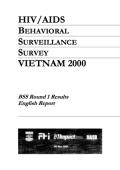
Resource | Publications,
The Behavioral Surveillance Survey (BSS) was introduced in Vietnam in 2000 to compliment the extensive sero-prevalence and passive HIV surveillance systems instituted nationally. Vietnam is currently experiencing an HIV epidemic 'concentrated' primarily in populations with specific high-risk sexual and injecting drug practices. Behavioral surveillance was conducted in five provinces - Hanoi, Hai Phong, Da Nang, HCMC, and Can Tho.
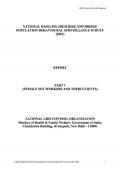
Resource | Publications,
BSS in the general population and high-risk groups is proposed to be undertaken thrice during the period 2001-2005.
The present report details the observations of the national baseline BSS survey among high risk and bridge groups, female sex workers and clients of female sex workers, which was conducted in 32 States and Union Territories of the country. This baseline provides basic information needed to strategize and prioritise programs under NACPII during its five years of implementation.
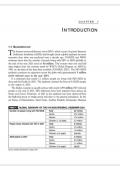
Resource | Publications,
Behavioral Surveillance Survey provides repeated measures in behavioral indicators for observing trends in high-risk behavior among the specific sub-population groups based on cross-sectional surveys.
The present report provides the detailed findings of the baseline survey conducted among the bridge group (Client of Female Sex Workers) and one high-risk population group (Female Sex Workers) seeking their present status on awareness, knowledge, attitude and behaviour with regard to STD/HIV/AIDS. The study has been conducted in 32 States and Union Territories of India.
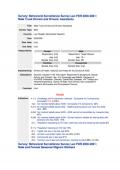
Resource | Data Sheets,
Sections included in the final report: Respondent's Background, Sexual Activity and Condom Use, HIV Knowledge and Beliefs, Exposure to HIV/AIDS Information, Sexually Transmitted Diseases, HIV Testing and Personal Experience. Survey of Male Truck Drivers was conducted in Vientiane Municipality and Champasak Province.

Resource | Data Sheets,
Sections of the final report cover: Background Information, Sexual Behavior, STD and HIV/AIDS Knowledge, STD Health Seeking Behavior, HIV Testing. Combined data from Tamilnadu and Pondicherry.
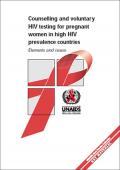
Resource | Publications,
For many years, little was known about preventing transmission of HIV infection from mother to child. Recently, however, many advances have been made in developing effective and affordable interventions that reduce the likelihood that a woman will pass HIV on to her baby. The two most important interventions—the provision of antiretroviral drugs and the avoidance of breastfeeding—only apply to HIV-positive women. Both therefore require that a woman know whether she is infect- ed by HIV. And yet in developing countries, where 95% of mother-to-child infections take place, there are very few counselling and testing services that allow a woman to find out her HIV status.
The document gives an overview of the magnitude of the problem of HIV transmission from mother to child. It then focuses on the benefits of counselling and voluntary HIV testing in the context of pregnancy, and discusses the content of such counselling. Operational issues and potential difficulties in setting up and maintaining such a service are explored.





